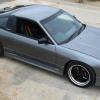Blitz Dual Solenoid Boost Controller Without The Solenoids For Insane $135 From $170
Announcements
-
Similar Content
-
Latest Posts
-
By robbo_rb180 · Posted
Selling hks rb25 cast manifold and waste gate. Never going to use as don't have Rb powered car Unknown condition of waste gate diaphragm $900 Pick up only Ipswich Qld -
Yeah it will surely need a diode to stop the headlight turning on when the indicator does, I'm pretty sure all it would need is a wire from the headlight parker wire (via a diode) to the indicator 12v. Assuming you also convert to LED that is....I'm not sure if the standard wiring will take the load of the extra indicator globes if they are incandescent
-
Post up or shoot me a list of anything you need (other than R34 specific), I've been meaning to move on some spares
-
Yeah they seemed surprised I'd like to know more than "The refund relates to an issue we identified where the way we calculated your premium was different to the information we provided you. "
-
So, Roll Cage for V37 time?! That's a huge mistake. Interestingly I just got my second SMS from St George saying they've made a mistake too and need to send me money. But only $14.93, not as great as yours!
-




Recommended Posts
Create an account or sign in to comment
You need to be a member in order to leave a comment
Create an account
Sign up for a new account in our community. It's easy!
Register a new accountSign in
Already have an account? Sign in here.
Sign In Now